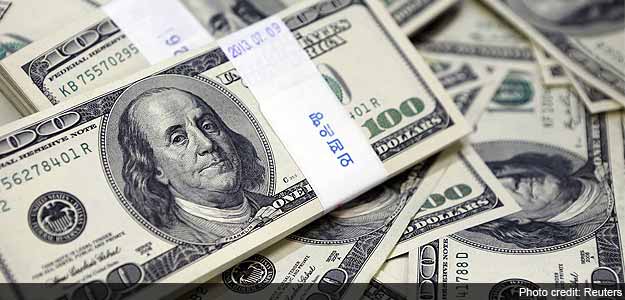
The
dollar held at two-month highs against a basket of major currencies
early on Friday, having extended gains as the market shifted its focus
to an eventual hike in U.S. interest rates.
The dollar index stood at 97.618, having risen as far as 97.756. A break above 97.775 will take the index back to highs last seen in April.
The greenback scaled a near one-month peak of 124.205 yen, while the euro struggled at $1.0884, not far off a 7-1/2 week low of $1.0855 set overnight.
The dollar index was up nearly 2 per cent in a week that saw Federal Reserve Chair Janet Yellen reiterate that U.S. interest rates will probably be lifted later in the year.
"The message that 'a rate hike this year makes sense' kept USD as an outperformer overnight," Greg Moore, senior currency strategist at RBC Capital Markets wrote in a note to clients.
Bank of England Governor Mark Carney also drew the market focus back onto global interest rates just as worries about Greece were fading.
On Thursday, Carney said the decision to lift British interest rates from record lows will come into sharper focus around the end of this year. Earlier in the week, he said the time for a hike was moving closer.
Unsurprisingly, sterling raced to a 7-1/2 year high on the euro, which skidded to 69.58 pence. Against the dollar, the pound stood at $1.5608, having peaked at a two-week high of $1.5676 on Wednesday.
While investors warmed to the dollar and sterling this week, the Canadian, Australian and New Zealand dollars all slumped to six-year lows as weakness in commodity prices crimped growth prospects in their respective economies.
Underscoring the bleak outlook, the Bank of Canada cut interest rates for a second time this year on Wednesday.
The Reserve Bank of New Zealand is considered almost certain to lower rates next week, while Australia's central bank is still seen keeping an easing bias for now.
The Canadian dollar last traded at C$1.2965 per USD, not far from a trough of C$1.2970 set overnight. The kiwi dollar dipped below 65 U.S. cents for the first time since July 2009, before steadying at $0.6519.
The Australian dollar stood at $0.7410, a day after skidding to $0.7350, a low not seen since mid-2009.
Trading in Asia is likely to be subdued with many centres closed for public holidays and amid an absence of market-moving data. U.S. inflation data is due later in the day.
The dollar index stood at 97.618, having risen as far as 97.756. A break above 97.775 will take the index back to highs last seen in April.
The greenback scaled a near one-month peak of 124.205 yen, while the euro struggled at $1.0884, not far off a 7-1/2 week low of $1.0855 set overnight.
The dollar index was up nearly 2 per cent in a week that saw Federal Reserve Chair Janet Yellen reiterate that U.S. interest rates will probably be lifted later in the year.
"The message that 'a rate hike this year makes sense' kept USD as an outperformer overnight," Greg Moore, senior currency strategist at RBC Capital Markets wrote in a note to clients.
Bank of England Governor Mark Carney also drew the market focus back onto global interest rates just as worries about Greece were fading.
On Thursday, Carney said the decision to lift British interest rates from record lows will come into sharper focus around the end of this year. Earlier in the week, he said the time for a hike was moving closer.
Unsurprisingly, sterling raced to a 7-1/2 year high on the euro, which skidded to 69.58 pence. Against the dollar, the pound stood at $1.5608, having peaked at a two-week high of $1.5676 on Wednesday.
While investors warmed to the dollar and sterling this week, the Canadian, Australian and New Zealand dollars all slumped to six-year lows as weakness in commodity prices crimped growth prospects in their respective economies.
Underscoring the bleak outlook, the Bank of Canada cut interest rates for a second time this year on Wednesday.
The Reserve Bank of New Zealand is considered almost certain to lower rates next week, while Australia's central bank is still seen keeping an easing bias for now.
The Canadian dollar last traded at C$1.2965 per USD, not far from a trough of C$1.2970 set overnight. The kiwi dollar dipped below 65 U.S. cents for the first time since July 2009, before steadying at $0.6519.
The Australian dollar stood at $0.7410, a day after skidding to $0.7350, a low not seen since mid-2009.
Trading in Asia is likely to be subdued with many centres closed for public holidays and amid an absence of market-moving data. U.S. inflation data is due later in the day.

No comments:
Post a Comment